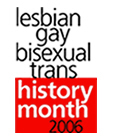 FEBRUARY
FEBRUARY
IS Lesbian, Gay, Bisexual and Transgender (LGBT) History Month. The idea
comes from Black History Month as a way to redress the lack of
acknowledgement of the history of LGBT people in society, schools,
colleges and education as a whole. School’s Out! the LGBT education
campaigning group, started things off in 1994 – at that stage, as a
grassroots campaign.
By Marc Vallée, Socialist Party LGBT Group convenor
Today, LGBT History Month is backed by the Metropolitan Police, CPS,
Department of Health, TUC, Amnesty International and even Transport for
London. The main aim is to "break down the legacy of silence"
that surrounds the history and struggle of LGBT people.
It is important to know the true history of the fight for LGBT
liberation as a way to better defend ourselves in the future. This was
sharply marked by the homophobic attack by the fascist British National
Party (BNP) on LGBT History Month on its website. The BNP calls on
parents to protest against "unwholesome ‘alternative life-style’
propaganda" and "unhealthy and unwanted social-engineering
indoctrination exercises". The BNP goes on to say that it is time
to return to the teaching of "traditional and time proven Christian
standards of morality".
The fight for LGBT liberation and for a socialist future has a long
and proud history. There is not room to cover all that history in this
article, but a look at the impact of the Bolshevik revolution in Russian
of 1917 and the German revolution of 1918 on the movements for
homosexual liberation show that history.
 "Protest
"Protest
in 2005 outside the Iranian Embassy in London about the brutal public
execution of two gay teenagers for the so-called ‘crime’ of
homosexuality."
Photo: Alex
Christie.
In Bolshevik Russia all penal restrictions on homosexual activities
were removed. For a period in the 1920s, the Soviet moral code was seen
as an enlightened model for the rest of the world. The rights of
homosexuals were, to a degree, affirmed and protected. The Bolshevik
Gregorii Batkis described the attitudes of the new, socialist society in
1923:
"The present sexual legislation in the Soviet Union is the
work of the October revolution. This revolution is important not only
as a political phenomenon which secures the political role of the
working class, but also for the revolutions which evolving from it
reach out into all areas of life… [Soviet legislation] declares the
absolute non-involvement of state and society in sexual relations,
provided they harm no one and infringe upon no one’s interests…
Homosexuality, sodomy and various other forms of sexual gratification
set forth in European legislation as offences against public morality
are treated by Soviet legislation exactly as is so called ‘natural’
intercourse."
With the counter revolution under the leadership of Stalin, in March
1934, homosexuality once again became a criminal offence and the
Communist (Stalinist) movements of the rest of the world soon followed
suit in labeling homosexuality "unsocialist". Stalin denounced
homosexuality as the product of the "decadence in the bourgeois
sector of society", and even a "fascist perversion"!
In 1918, the German Communist Party taking its lead from the
successful revolution in Russia in 1917, argued for complete equality
for lesbians and gays. The famous gay rights campaigner, Hirschfeld,
recognised the radicalising effect of the revolution: "The events
of the year 1918 have doubtless had a certain effect on the liberation
struggle of homosexuals… For beyond the groups of humane and just
scientists, homosexual organisations have arisen… and have taken up
the struggle for their fellows."
After the defeat of the Germen revolution, which had given Hirschfeld
and others the chance to put gay rights on the political map, the
growing gay movement moved back, basing itself on the belief that,
"The liberation of homosexuals can only be the work of homosexuals
themselves" within a capitalist framework – like so many LGBT
rights groups today.
Hirschfeld was a courageous person who suffered for his outspoken
views. He was badly beaten up in 1920, attacked and left for dead with a
fractured skull in 1921, and shot at during a lecture in 1923. He died
in 1935. Yet, in all his years of campaigning, he never achieved his
goal of law reform, let alone wider liberation for gay people.
The defeat of the German revolution tragically left the gay movement
unable to defend itself against the fascist nightmare years later, which
ended with tens of thousands of gays being murdered in concentration
camps alongside Jews, socialists and communists.
Prejudice is an intrinsic part of the capitalist system. Capitalist
ideology is advanced to justify the privileged existence of an elite at
the expense of the majority and thrives on the inequalities in society
which it creates.
In contrast, a socialist society, with democratic working-class
control and management of industry and society’s resources, would
promote unity and co-operation. Under these conditions, prejudice would
begin to evaporate and personal relationships would be freed from the
restrictions imposed by capitalism.
A strategy to achieve lasting LGBT liberation depends on linking the
day-to-day battles against anti-gay and anti-transgender discrimination
to the struggle to rebuild a mass movement for socialism and achieve a
socialist society.
We need to take the arguments for LGBT liberation and the fight
against capitalism into the trade unions, workplaces, schools, colleges
and youth clubs, into communities and voluntary organisations to rally
support behind the call for genuine equality that could stop homophobia.
Knowing our history is a start. The point is to doing something with
that knowledge and that is to fight for a socialist society which is the
only way we can achieve real and lasting LGBT liberation.
The Socialist Party LGBT Group and Socialist Students will be holding
a number of meetings on LGBT History.
Contact us for more info at [email protected], or visit our
website: www.socialistparty.org.uk/liberation/index.html







